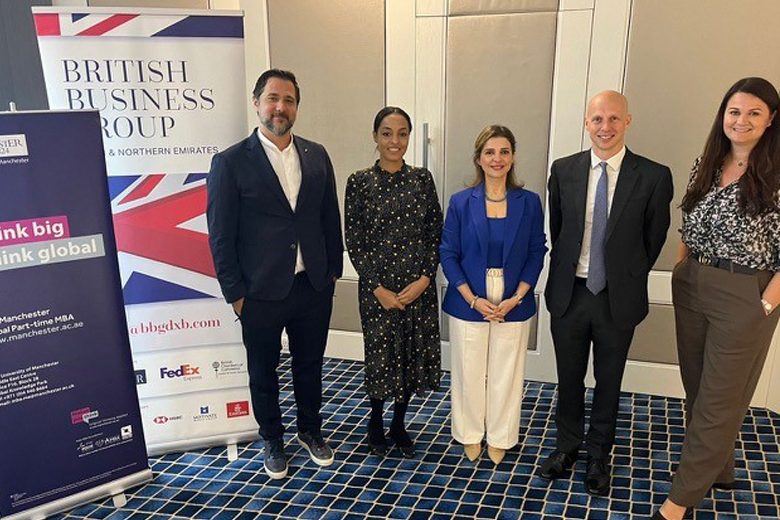Kamran Kardan, Founder & CEO, Knowledge E and Zendy, Aisha Amarsi, Senior Manager – HR, Hays, Hiba Abbassi, Manager, Careers & Alumni Relations, University of Manchester and Roland Hancock, Education Leader and Chief Sustainability Officer, PwC Middle East with Katy Holmes, General Manager, British Business Group
A panel of experts convened by the British Business Group Dubai and Northern Emirates (BBG) has discussed how to bridge the divide between employers and employees through lifelong learning, in the wake of recent workplace phenomena like quiet quitting and the great resignation. The debate referred to findings in the recent Hays GCC Salary Guide 2023, which showed that while 35% of employers strongly agree that their organisation has the talent needed for the year ahead, 82% of employees firmly believe that they have the necessary skills to fulfil their role in 2023.
Joining the panel discussion were Hiba Abbassi, Manager, Careers & Alumni Relations – Middle East Centre, The University of Manchester; Kamran Kardan, Founder & Chief Executive Officer at Knowledge E and Zendy; and Aisha Amarsi, Senior Manager – Human Resources at Hays. Moderated by Roland Hancock, Education Leader and Chief Sustainability Officer, PwC Middle East, the panel first highlighted the changing nature of in-demand skills, which has brought about the disconnect between employers and employees and prompted the debate around lifelong learning responsibilities.
Speaking about the changing nature of skill requirements, Hiba said, “Employers were previously looking for technical competencies among new hires, and while these are still important, we have seen a shift in demand from hard skills to soft skills, such as emotional intelligence, leadership, teamwork, and problem solving. Active learning is also among the leading skill requirements for 2023, demonstrating that employers are looking for employees who are engaged in continuous self-development.”
Education and recruitment experts debate skill needs of the future
Revealing the survey data that showed divergent opinions on the employer-employee skills match, Aisha explained, “Employers are now looking for creativity in the workplace; they need candidates that will solve emerging challenges, like adapting to sustainable development and diversity goals. Applicants need to demonstrate how they can add value to an organisation and take it to the next level, rather than simply providing a prescriptive set of skills.”
Examining the role and responsibilities of employer versus employees in lifelong learning, the panel agreed that individuals should take responsibility for developing their strengths, and that businesses should be enablers in the process. Kamran said, “There is a shortage of talent, so employers need to stand out and be clear about what they are looking for. It’s not only the responsibility of employees; businesses have the tools to facilitate continual learning and can work with other stakeholders like government and academia to build a learning-based culture that starts at a young age.”
Discussing the development of a sustainable lifelong-learning ecosystem, the panel concluded that employees need to adopt a shift in mindset, to recognise upskilling and re-learning as an integral part of their career, and to think about how they can contribute to their organisation as if it were their own business. Meanwhile, the panel encouraged employers to collaborate with policy makers and educators to take a multi-disciplinary approach to setting and achieving a shared vision for lifelong learning.
”Organisations need to prioritise their employees’ upskilling for both retention and attraction”
Staged in collaboration with the UK Department for Business and Trade, and sponsored by The University of Manchester, the panel discussion was one of a series of BBG events spotlighting the latest industry trends and business challenges. Sunita Mirchandani, UAE Lead Adviser for Education and Training at the UK’s Department for Business and Trade said, “Lifelong learning is vital to increase employability skills and for personal and professional development. The UK’s Department for Business and Trade in the UAE was pleased to partner with the BBG and the University of Manchester to host an event on this relevant and important topic.”
Commenting on his participation, Roland Hancock said, “With the rapid transformation happening in the region, organisations need to prioritise their employees’ upskilling for both retention and attraction, as found in our latest Hopes and Fears survey. As lifelong learning becomes increasingly normalised and embedded with individuals and employers, it stops being a differentiator and starts to be an imperative without which people will fall behind. We are entering the age of continuous learning.”
Katy Holmes, General Manager, British Business Group Dubai and Northern Emirates added, “Education and the apparent disconnect between academia and industry are common discussion points across many of the sectors represented in the BBG Membership. This panel event was one of a series where we examine the roles, access, relevance and accountability within lifelong learning, from school age through to CEO peer-to-peer mentorship, with an emphasis on knowledge sharing to future-proof business and to build a more robust and ready talent pipeline for industry.”









